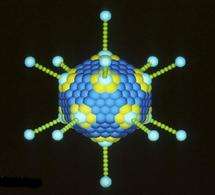'Tamed' virus wipes out cancer cells safely

(PhysOrg.com) -- Scientists at Oxford University have tamed a virus so that it attacks and destroys cancer cells but does not harm healthy cells. The research funded by Cancer Research UK is published in the journal PLoS Pathogens.
The research team modified a common virus - called an adenovirus - so that it could deliver genetic therapy to destroy tumours without poisoning the liver. The changes enabled the virus to keeps its natural ‘infectious’ characteristics to replicate in, and kill, cancer cells in mice. But for the first time the virus is also recognised and destroyed by healthy mouse liver cells, so it is no longer toxic.
Adenoviruses have been used as cancer therapies in clinical trials in the UK but have not yet been licensed. To date the viruses have always been converted to a weakened form so they don't cause organ damage. This is achieved by deleting parts of the virus’ genetic information. In this research the scientists have for the first time modified a virus so that it cannot replicate in the liver and cause liver damage, allowing the virus to be used at full strength and to maximum effect.
Lead author, Professor Leonard Seymour, a Cancer Research UK scientist in the Department of Clinical Pharmacology at Oxford University, said: ‘The approach we developed is easy to use and flexible. It may help in the development of future therapeutic viruses that are specific to certain disease sites. This modified virus was effective in these laboratory studies, but transfer of the technology to the clinic to be used with patients will require further work.’
The scientists made the modifications to the adenovirus by incorporating binding sites for a type of regulatory molecule called microRNA into the virus’s DNA. MicroRNA is slowly emerging as a key player in how cells control their internal reactions. A particular microRNA called mir-122 is known to regulate reactions inside liver cells.
The researchers reasoned that, by inserting binding sites for mir-122 into the virus’s DNA, the virus wouldn’t be able to reproduce inside the liver cell, rendering it effectively harmless. They found that the addition of four separate mir-122 binding sites to the virus’s DNA decreased replication of the virus 50-fold, and crucially didn’t cause liver damage.
Modified naturally-occurring viruses have already had important uses in medicine including their use as vaccines, notably for measles, mumps, polio, influenza, and chicken pox. They have already been developed as potential cancer-killing therapies, in an approach called virotherapy.
Provided by Oxford University













